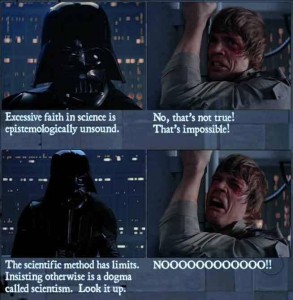
Esta entrada también está disponible en: Spanish
Answering the Skeptic: I Only Believe in Science
I often encounter skeptics whom affirm that science is the only reasonable way to obtain knowledge and truth. This position is called scientism and, while I believe science is wonderful and can provide us with all sorts of valuable data, I also believe that some of the most basic and relevant knowledge we hold cannot be obtained through science or the scientific method.
I often encounter skeptics whom affirm that science is the only reasonable way to obtain knowledge and truth. This position is called scientism
- Logic. Logical truths can’t be proven by science. Science has to assume and presuppose that logic works to even begin to do science given that science is a logical enterprise. It has been said that science is a slave to philosophy precisely because of this. To try to prove logic using science is to beg the question (arguing in a circle).
- Mathematics. Science has to assume that numbers and mathematical equations, accurately describe the inner-workings of the universe. It is wonderful how some complex mathematical abstractions describe the movement of fluids, the behavior of particles or the trajectories of celestial bodies.
- Language. Science assumes that written and spoken language is adequate to describe the cosmos. When a scientist reports theories and theorems, he has to use language that others can understand. So science presupposes that Language is adequate to express truth.
- Metaphysical Truths. Scientists have to assume that there are minds, other than their own, with intelligence and the power of discernment. That their own mind is not a deterministic mass of chemicals, but an instrument capable of abstraction, calculation, and discovery.
- Reality. Scientists assume that the external world is real and intelligible, that the past was not created a few minutes ago (with an appearance of age) and that the observer exists separate from the observed.
- Reliability of the Senses. Scientific knowledge presupposes that the senses and the mind are reliable tools of observation.
- Truth. Scientific discovery assumes that there is objective truth and that truth is knowable. An epistemological system is necessary to do science.
- Order and uniformity. For a theory and an experiment to be brought forth, scientists assume that the world operates in a uniform manner and law-like fashion. Science requires that the same experiment—conducted under similar conditions—produce the same results. There is nothing inherent to science that requires the uniformity of nature.
- Ethical Beliefs and Moral Values. Statements of value and duty are not accessible to the scientific method. You can’t prove that the holocaust and the Rwanda genocide were evil; yet scientists are rational to assume those events were indeed profoundly evil. In fact, practitioners of science must adhere to ethical codes including objectivity and honesty while reporting data and papers.
- Aesthetic Judgments. Beauty cannot be proven scientifically. Science is agnostic to a beautiful sunset, a poem or a great piece of music, yet scientist often refer to scientific theories as “elegant” and “beautiful.”
- The Scientific Method. Finally and most notably, science cannot be justified by the scientific method. Science is permeated with un-provable assumptions. For example, the special theory of relativity hinges on the assumption that the speed of light is constant in a one-way direction between two points.
 As can be seen, there are many things that a sane person or scientist is perfectly justified to hold apart from what can be known from science.
As can be seen, there are many things that a sane person or scientist is perfectly justified to hold apart from what can be known from science.
There are many things that a sane person or scientist is perfectly justified to hold apart from what can be known from science. This is not an indictment on science; on the contrary: knowing science is a wonderful and noble occupation.
Here is Dr. William Lane Craig answering a question related to science and scientism:
https://youtu.be/ceI5o6OVIsY


